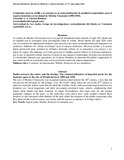| dc.rights.license | http://creativecommons.org/licenses/by-nc-sa/3.0/ve/ | |
| dc.contributor.author | Cherini Ramírez, Serenella A. | |
| dc.date.accessioned | 2015-01-29T20:04:25Z | |
| dc.date.available | 2015-01-29T20:04:25Z | |
| dc.date.issued | 2015-01-29T20:04:25Z | |
| dc.identifier.issn | 1690-4818 | |
| dc.identifier.uri | http://www.saber.ula.ve/handle/123456789/39635 | |
| dc.description.abstract | La ciudad de Mérida (Venezuela) estuvo en parcial aislamiento hasta entrado el siglo XX, hecho que no impidió que lo extranjero fuese privilegiado sobre lo criollo. Desde finales del siglo XIX contó con un comercio de importación dinámico que proveía a las clases económicamente privilegiadas con productos utilitarios de ‘última tecnología’ para el espacio doméstico. Revistas locales y la prensa diaria promovían gran variedad de artículos, haciendo énfasis en su naturaleza, sus marcas y sus países de origen. Sin embargo, ese ávido gusto por lo foráneo generó críticas en la prensa emeritense, por lo que el siguiente trabajo muestra el modo en que algunos comerciantes ofrecían esos productos al consumidor mientras que pensadores de la época llamaban la atención del público expresando lo que creían perdía la sociedad/el país con la aceptación pasiva de objetos importados. | es_VE |
| dc.language.iso | es | es_VE |
| dc.rights | info:eu-repo/semantics/openAccess | |
| dc.subject | Comercio de importación | es_VE |
| dc.subject | Mérida | es_VE |
| dc.subject | Productos de uso doméstico | es_VE |
| dc.title | Contiendas entre lo criollo y lo extranjero: la comercialización de productos importados para el espacio doméstico en la ciudad de Mérida-Venezuela (1890 - 1950) | es_VE |
| dc.title.alternative | Battles between the native and the foreign: The commercialization of imported goods for the domestic space in the city of Merida between 1890 and 1950 | es_VE |
| dc.type | info:eu-repo/semantics/article | |
| dc.description.abstract1 | The city of Merida (Venezuela) was in partial isolation until entered the 20th century, a fact that did not prevent the privilege of ‘the foreign’ over ‘the creole’ thing. Since the end of the 19th century, it enjoyed a dynamic import trade that provided the wealthy classes with top-technological products for domestic use. Local magazines and daily newspapers promoted many articles, emphasizing their nature, their brands and their countries of origin. Nevertheless, this eager taste for the foreign generated critiques in the press, so the following work shows how some retailers offered those products to the consumer while thinkers of the time called the attention of the public expressing what they believed the society/country was losing with the passive acceptance of foreign objects. | es_VE |
| dc.description.colacion | 2-23 | es_VE |
| dc.description.email | serenellacherini@gmail.com | es_VE |
| dc.description.frecuencia | semestral | |
| dc.identifier.depositolegal | 200302ME1486 | |
| dc.subject.facultad | Facultad de Humanidades y Educación | es_VE |
| dc.subject.keywords | Import trade | es_VE |
| dc.subject.keywords | Products for domestic use | es_VE |
| dc.subject.publicacionelectronica | Procesos Históricos | |
| dc.subject.seccion | Procesos Históricos: Artículos | es_VE |
| dc.subject.thematiccategory | Artes y Humanidades | es_VE |
| dc.subject.tipo | Revistas | es_VE |
| dc.type.media | Texto | es_VE |


